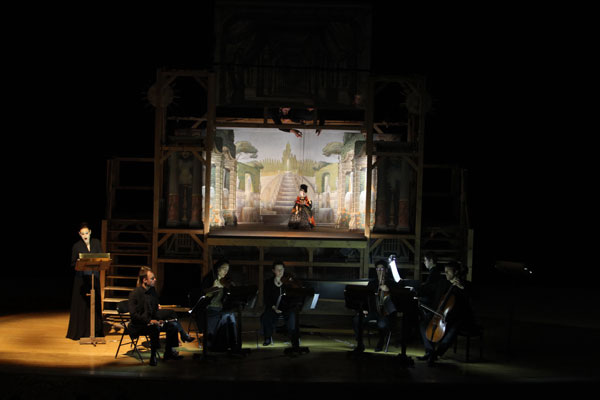 |
|
Ensemble Philodor, directed by Mira Glodeanu, provides the show's soundtrack with historical instruments.[Photo by Pang Bo/China Daily] |
On the stage was a small puppet theater with the musicians playing in front of it during the show. As the frame and sides were left open, the audience could clearly see scene-changes and the work of the puppeteers throughout the performance. The singers were situated in front of the puppet stage, with Phedre on the left and Thesee on the right. Puppeteers sang the parts of Hippolyte and Aricie. With beautiful puppets constructed, manipulated and dressed as they were in Rameau's time, the parody tries to revive the spirit of the French opera.
|
French countertenor singer rehearses at National Grand Theater |
A scene which centers on the stepmother Phedre's passion for her stepson Hippolyte, following the death of her husband, is an amusing farce, as the stepmother tries everything, from leaping onto him and rushing around the stage, to make Hippolyte interested in her. Thwarted - as Hippolyte is faithful to his love with Aricie - Phedre flies around the stage in anger, banging her head against the walls and pillars.
The most amusing scene comes when Hippolyte goes into the countryside and contemplates his dilemma because his father thinks he's having an affair with the queen. The scene opens with an empty stage set as a pastoral scene. A hen enters and clucks and pecks around the stage. Hippolyte enters, complaining about his dilemma and after each sentence, he is answered by the hen. The scene concludes with Hippolyte raising his voice, making the hen fly up in surprise and then dropping an egg onto the stage, which made the audience burst into laughter.
The parody performance, a perfect interaction among singers, puppeteers and music players, was in French using authentic pronunciation, with Chinese subtitles displayed on two screens on the left and right sides of the stage.
Apart from marvelous puppeteers and the beautiful costumes of the marionettes, soprano Marie Kalinine's Phedre and baritone Alain Buet's Thesee were quite impressive.
Ensemble Philodor, directed by Mira Glodeanu, provided an audio feast of historical instruments, with two violin players, a viola player, a viola da gamba player, a harpsichord player, an oboe player and a flute player. Violinist Mira Glodeanu and viola da gamba player Nils Wieboldt were most impressive as they reproduced the charm of the elegant baroque music.
|
|
|
|
|
|
|
|
